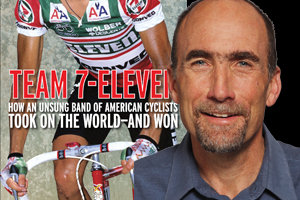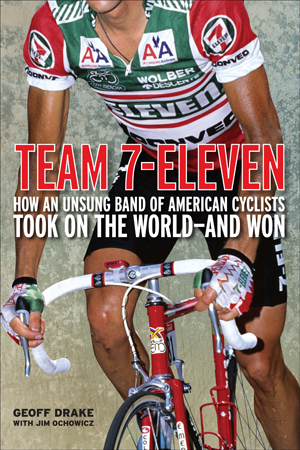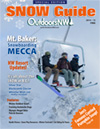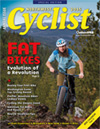Q&A with Geoff Drake

By Hilary Meyerson
Geoff Drake was one of the featured presenters at this year’s Seattle Bike Expo. He’s a past editor of Bicycling magazine and Velo News, and has covered three Olympic Games and the Tour de France. He discussed his book, Team 7-Eleven: How an Unsung Band of American Cyclists Took on the World—and Won, at the Expo. He’s a former Seattleite who now lives in California, though we won’t hold it against him. He took the time to talk with us.
ONW: Let’s hear your Seattle cycling street cred.
GD: I went to UW, where I was very involved in the cycling community. I was a bike shop mercenary in college, and I spent most of my earnings on bike parts. I worked at R&E Cycles, U-District Cycles (which used to be next to the Neptune), and the Bicycle Centers on Sandpoint Way and in the University District. I used to teach cycling classes too. I ride the Burke-Gilman and Lake Washington Boulevard whenever I come up to visit my daughter, who’s also a UW grad, and other relatives. I do laps around Mercer Island. There was a time when I lived with a bunch of bikeys in college, and we ran the Cascade Bike Club hotline out of a closet in our house. I’ve ridden the STP four times, including once on a tandem with my wife, who also went to UW.
ONW: Fair enough. Why did you write this book?
GD: It was an idea that’s time had come. It’s taken a couple of decades for people to realize the role the 7-Eleven team played in cycling on a world stage. The team set the stage for Lance Armstrong and all that was to come.
ONW: Why was the team so important to American cycling?
GD: Everyone has heard of Lance, but he wouldn’t have achieved so much without the team laying the foundation. They made inroads into a European cycling culture that was off limits to Americans before. Americans in ’70s and ’80s would go to Europe and come home chastised. This team took American culture to Europe and changed it.
ONW: Was there a turning point?
GD: The team won stages in the ’85 Tour of Italy, which shocked the European peloton. Then they briefly wore the yellow jersey in the ’86 Tour de France—Alex Stieda became the first North American to ever earn that honor, even though he lost the jersey three hours later! They continued to be successful throughout the ’80s. When 7-Eleven had financial difficulties in ’89, the sponsorship of the team was picked up by Motorola. Lance Armstrong turned pro one day after the Atlanta Olympics road race, under the Motorola banner. And the person who originated and managed both teams was Jim Ochowicz, my co-author.
ONW: What are you going to cover at the Expo?
GD: I’m going to talk about the genesis of the book, why I wrote it, and the overall importance of the team. I’d like to tell anecdotes about the riders, who would be spectacularly inept one day, and incredibly good the next day. They were not greeted warmly by Europeans. They had to fight their way into the culture. Some of these guys were real characters. Eric Heiden, the Olympic speed skater, was the magnet for the initial sponsorship, because he was attractive to 7-Eleven. I’ll talk about a bunch of the riders from the team.




